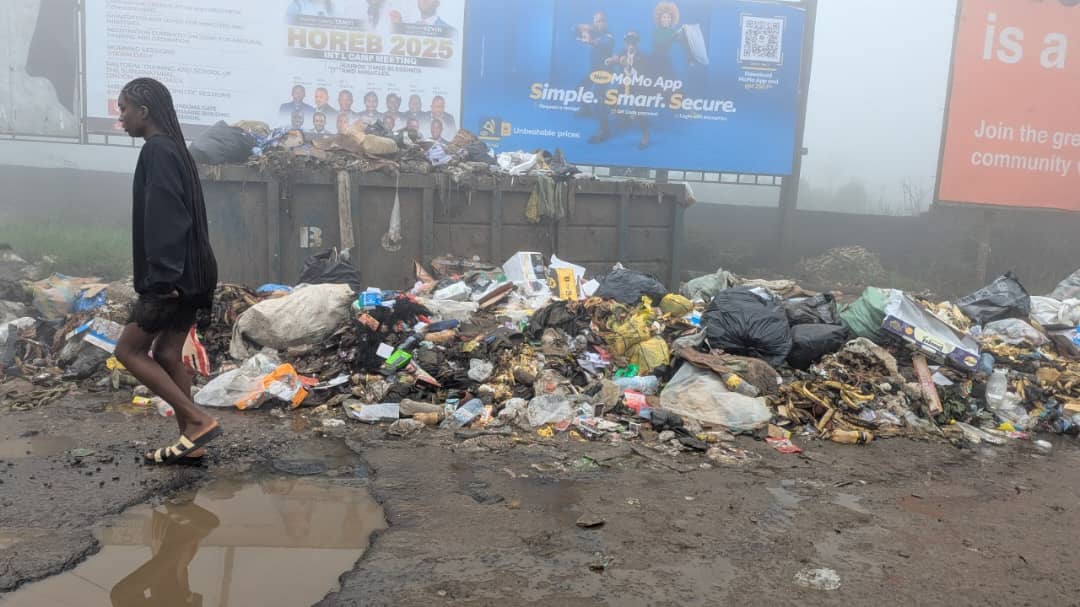The streets of Buea, the capital of Cameroon’s Southwest Region, are marred by litter, blocked drainages, and a pervasive sense of neglect. Residents are growing increasingly frustrated with the city’s deteriorating environment, and they are pointing fingers at both the Buea Council and HYSACAM, the waste management company tasked with keeping the city clean.
From health risks to a tarnished image to tourists, the poor approach to waste management in Buea has sparked demands for accountability and reform among residents.
Ndi Mark Kanjo, a student at the University of Buea who has lived in the city for a year, says the situation is dire.
“As a resident in Buea, I have to say that, honestly, the places are very dirty,” he told The Post. “There’s litter everywhere, and it’s a big concern to us residents.”
Kanjo explained that the surroundings are unfit for habitation, particularly for children, due to the health hazards posed by unchecked waste disposal habits. “We need more trashcans and better waste management. It’s not a pleasant environment, especially for children,” he pressed on.
Kanjo’s concerns extend beyond just physical state of the environment. He observed that improper waste disposal has led to blocked drainages, causing flooding and creating breeding grounds for mosquitoes.
“We have had instances where drainages are blocked and it creates a breeding ground for mosquitoes. The authorities need to step in and clean up. It’s affecting our health and our overall wellbeing,” he continued. As the capital of the Southwest Region, Kanjo believes Buea’s unkempt state sends a negative message to tourists and visitors, undermining the city’s reputation.
While some residents point to systemic failures, others, like Tambeng Fabrice, a 26-year-old grinding machine operator who has lived in Buea for seven years, argues that citizens also contribute to the problem.
“Some of us do not contribute to keeping the environment clean by throwing dirt outside the trashcan, even when it’s empty. Some of us eat and carelessly throw our waste anywhere, anyhow…,” he said.
Fabrice observed that some residents justify littering because the environment is already dirty, believing their actions make little difference. He also observed a reliance on HYSACAM, with some assuming it’s solely the company’s responsibility to maintain cleanliness, and not the residents’.
However, Fabrice was quick to criticize HYSACAM’s inconsistent service. “HYSACAM doesn’t come around often. That is why most people are forced to throw dirt around bridges and waterways, hoping that heavy rainfall will carry it away; while some people find small spaces around their homes to burn dirt,” he furthered.
“So, when HYSACAM delays this much to do their jobs, how do they expect us to cope? The HYSACAM people are not doing enough. They should come around at least twice in two weeks. Make use of town planning and provide trashcans at all angles in Buea. And ensure to empty once every week.”
For Tabi Ntem, a 21-year-old university student who has lived in the city for nearly five years, the lack of accessible waste disposal options has led to personal conflicts.
She recounted an experience: “I was once attacked by a certain man for throwing dirt at OIC Bridge because I ignored the notice board that read, ‘No throwing dirt here, penalty, FCFA 25,000’. Yes, I saw the notice board, but I had no choice. This man threatened to take me to the council to pay a fine, not because he was a council worker, but because the smell of our waste disturbs his breathing space which I understood. That board there was not even put there by the council; he did it to prevent us from throwing dirt there. And when I asked him to show me a place to throw my waste, he couldn’t speak. I had to beg him to settle the matter.”
Ntem explained that she continues to use the OIC bridge for waste disposal due to the lack of alternatives.
“There is a small piece of land beside my house where I used to throw dirt, but the owner has warned me to stay off his land and the closest trashcan is about a thirty minutes walk from my house, but at least, the OIC Bridge is 10 minutes,” she noted.
She stressed that this is inconvenient: “The council and HYSACAM people should do something about it, if not we’ll have no other option than to continue our usual way and they shouldn’t complain.”
Ntem also criticized the council’s leniency with HYSACAM: “Their actions make me think that the HYSACAM people are irresponsible and the council is too relaxed about it, because if they pressurize them, they’ll do something.”
She urged the authorities to lead by example, providing adequate trashcans and regular waste collection to encourage residents to maintain cleanliness.
The waste management crisis in Buea is not new. A report by Dorothy Telelen Atabong, the Southwest Public Independent Conciliator, published on April 1, 2025, noted the “glaring difficulties” faced by the Buea and other councils in the Southwest region in managing garbage.
Atabong pointed to unpaid government bills to HYSACAM as a key issue slowing down waste collection efforts. She proposed that councils establish autonomous garbage disposal systems under their hygiene and sanitation departments, suggesting a “symbolic garbage disposal tax” of about 1,000 FCFA per household annually to fund these initiatives.
Currently, HYSACAM handles household waste collection in Buea, but the company frequently cites unpaid dues from the government as a barrier to consistent service.
This has left residents like Kanjo, Fabrice, and Ntem grappling with limited options, resorting to burning waste, dumping it in unauthorized areas, or waiting for sporadic collections.
Buea’s residents are united in their demand for a cleaner, healthier city. Without urgent action from the Buea Council and HYSACAM, the city risks further deterioration, threatening public health and its reputation as a regional capital.
By Tabi Brinette (UB Journalism Student on Internship)

